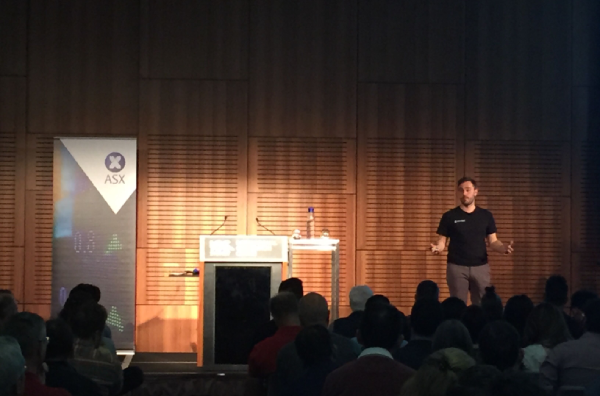I recently presented at the ASX Investor Day in Sydney, which I was thrilled to be asked to do since the ASX has featured heavily in my life.
First winning the ASX share game as a school student, then as the work experience kid and more recently as the CEO of Stockspot.
The topic the ASX gave me was: ‘Why invest on the ASX? How to pick the best investments’.
I really enjoyed the opportunity to present to 300+ eager investors and hopefully provide some useful tips to help make them better investors.
After the talk I had the privilege to speak to a lot of people about their investing experiences. Some were savvy and managing $5 million+ portfolios, others were dipping their toes in for the first time and there were even some high school students keen to pursue a career in markets.
What stood out most were the many people with stories of being burnt in the past by poor financial advice now looking to get back in the market.
Here are some of my key learnings from the ASX Investor Day
Consumers are cost conscious
It’s great to see people are more cost conscious. A lot of people I spoke to think $10-$20 a trade is too expensive for brokerage particularly when they see in the US brokerage is free. They’re right, it is too expensive.
It was also interesting to hear many people are fed up with the fees charged by active fund managers who haven’t come through with the goods even in down years like 2018. Those who were aware of ETFs loved that they’re low cost and the diversification they give you.
Investors are wising up about why they lost money
I spoke to a lot of people who were burnt in the past from bad financial advice and lost money. They were in the process of re-educating themselves on what investing options were available to them as they’d lost faith in traditional financial advisers and fund managers.
What I’ve learned is that the investment industry wants you to buy and sell shares so they can make money. Thousands of financial advisers, brokers and consultants get paid when you’re buying and selling. However every dollar you pay the investment industry comes out of your returns.
Many of the places investors had lost money were products that pay handsome commissions to the investing industry; floats and IPOs, hybrids and forestry schemes to name a few. In my opinion, products that pay a fee to the investment industry to sell are products that are best avoided.
That’s why Stockspot only invests in ETFs because they’re low cost and they won’t pay advisers to sell them, which means there’s more money leftover for you. We think anyone with a long-term investment focus shouldn’t do anything other than invest regularly in ETFs.
Unfortunately there aren’t more advisors recommending them because the traditional financial industry can’t make enough money selling them. Most full service wealth management businesses still flog more risky products because they pay more fees.

Global Financial Crisis PTSD
I think it’s a bit of a fallacy to say Australia missed out on the GFC. Sure the economy didn’t fall into recession like the US and Europe but a lot of retail investors bore the brunt of it.
One couple I spoke to lost a lot of money in the GFC due to poor advice, understandably they’ve been reluctant to invest and now keep all their money in cash. Intellectually they know their money is going backwards but a big financial loss can cause serious emotional impact for a long time.
I would never be so arrogant to tell someone who has experienced a major financial loss their ‘leave it in cash’ strategy is flawed.
However my advice for people looking to get back into investing is the same I give to everyone: keep your costs low and diversify your investments across broad market ETFs that include growth assets like Australian and global shares and defensive assets like bonds.
That will help prevent you from falling into the same traps.
Diversification still needs to be championed
The best offense is a good defense. This is a point I and many of the other speakers made on the day. Good diversification simply means combining different types of investments with different characteristics to improve the quality of returns in your portfolio and reduce risk.
A lot of people still buy individual shares from just Australia or the same sector (like banks) with the false belief they’re ‘diversified’, when in-fact this type of portfolio looks like a pressure cooker waiting to explode!
ETFs offer the best opportunity to investors to diversify across countries, sectors and asset classes to ensure their portfolio is diversified.
Picking hot stocks is not an investment strategy
Some investors had recently bought into tech stocks chasing the current market de jour and buying right at the top of the market.
Some of these folks might have the grit to hold through inevitable falls and ride the wave back up. More however will decide to cut their losses and sell (incur more brokerage) and buy something else (probably at the wrong time).
Humans like to chase things that do well. When it comes to investing this is not a good investment strategy because when something is hot it’s likely everyone already owns it! That’s when you want to be selling some, not buying.
Stockspot methodically rebalances clients’ portfolios to keep risk steady over time. When we re-balance it’s usually out of assets that have done well recently and into those that have done poorly. This is the opposite of chasing performance, it’s hard to psychologically on your own because it feels counterintuitive.
Find out how Stockspot makes it easy to grow your wealth and invest in your future.




